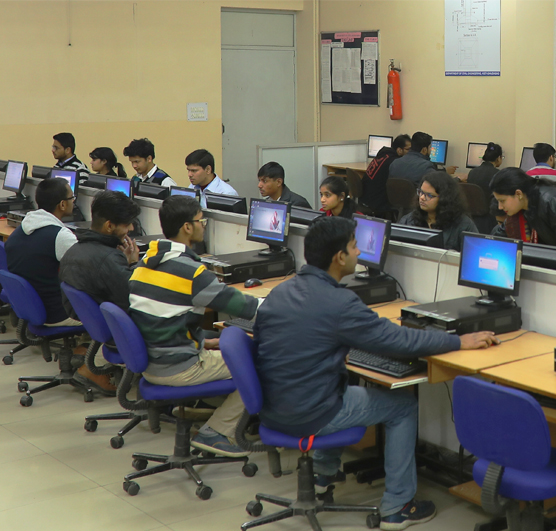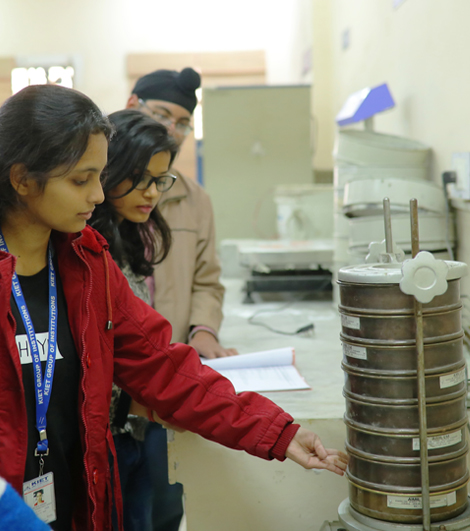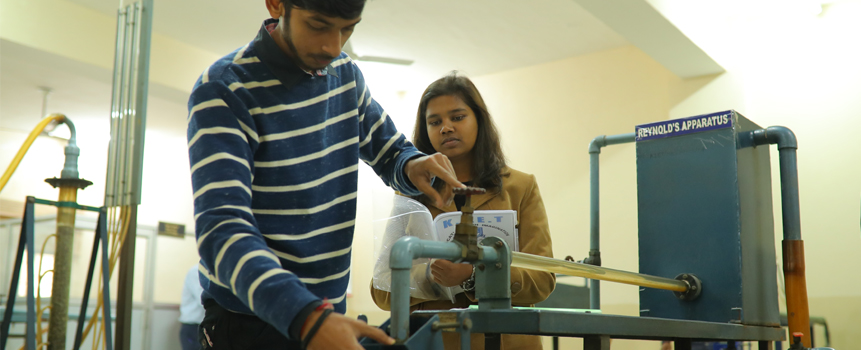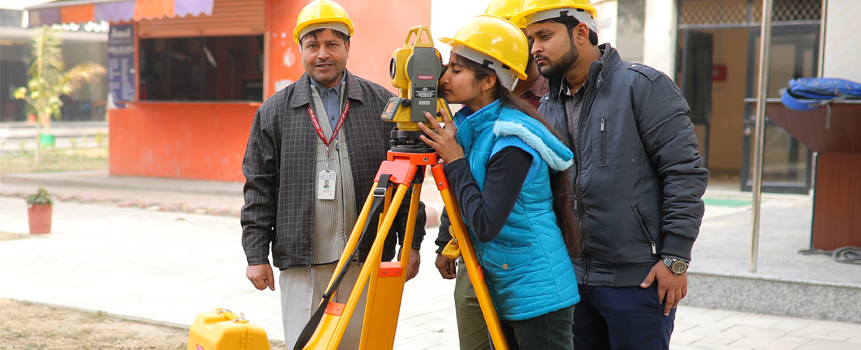Civil Engineering
Labs
CAD LAB
CAD Lab of this department was established for concept design and product realization. This lab is to primarily facilitate students to evolve concepts and convert them into a complete product. The lab covers STAAD-PRO (Structure analysis and design software), PLAXIS (Geotechnical software for analyzing and designing foundations), Water Gems, Sewer Gems covering water supply and sewerage systems. It also covers working on Project Planning and Management softwares like Primavera & MS Project latest versions to make our students well versed with analysis and design of structures and also inculcate managerial skills.


TRANSPORTATION LAB
The Transportation Engineering Laboratory is well equipped with instruments related to highway material testing and Traffic studies. The list of some of the experiments that can be conducted in the transportation engineering laboratory are as follows- Aggregate Test, Crushing Test, Impact Test, Los Angeles Abrasion Test, Flakiness and Elongation Index Test, Bitumen Tests, Penetration Test, Softening Test, Viscosity Test, Flash and Fire Point Test, Ductility Test, Stripping Test, Speed Radar Gun.
FLUID MECHANICS AND HYDRAULICS LAB
This lab has basic fluid mechanics set-up. The lab is equipped with different flow measuring set-ups such as Venturimeter, Orifice-plate, Pitot tube, Rotometer etc., where students can visualize the basic theory of how the flow meter works. The lab also has Reynolds setup, free-forced vortices setup, flow over open channel and impact of jet set-up, where students can fortify their theoretical knowledge. Hydraulics engineering is concerned with the flow and conveyance of fluids, principally water. Hydraulic engineering is the application of fluid mechanics principles to problems dealing with the collection, storage, control, transport, regulation, measurement, and use of water. Application of hydraulics engineering includes fluid mechanics, fluid flow, behaviour of real fluids, hydrology, pipelines, open channel hydraulics, mechanics of sediment transport, physical modelling, hydraulic machines, and drainage hydraulics.

STRUCTURAL ANALYSIS LAB
The structural analysis lab is well equipped and helps to understand the practical behaviour of the physical structural elements like beams, arches, column and struts etc. The list of apparatus, which are being used for conducting experiments in the Structural analysis laboratory are as follows - Elastic properties of deflected beam apparatus, Elastically coupled beam apparatus, Apparatus for verification of Clark's Maxwell reciprocal theorem, Two hinged arch apparatus, Curved member apparatus, Redundant joint apparatus, Unsymmetrical bending apparatus, Three hinged arch apparatus, Column and Strut apparatus.

ENVIRONMENTAL ENGINEERING LAB
The Environmental engineering lab facilitates the students to understand the practical aspects of environmental engineering involved in water supply engineering. In this lab various instruments like fluoride content with multi-parameter, Dissolved oxygen Multi-parameter, BOD Incubator & COD Meter, Particulate matter in air with HVAS, Level of noise pollution with noise meter, pH of water with pH meter, Turbidity of water with multi-parameter are placed. With the help of following instruments various tests are conducted which are as follows - BOD of Sewage water, COD of sewage water, Level of Dissolved Oxygen in water and waste water, Turbidity Determination in water and waste water, Determination of Fluoride Content in water, Determination of pH of Water and waste water, Determination Level of Noise, Determination of Particulate Matter in Air.

SURVEYING AND GEOINFORMATICS LABORATORY
The Surveying Laboratory is well equipped with instruments for measuring distances: vertical and horizontal, bearings: compass and elevation: automatic level. The measurements taken by these equipment are used for setting out highway and railway curves, performing levelling surveys, calculating the height of structures and for applying corrections to geodetic observations. The major equipment in our laboratory includes: Chain, Tape, Theodolites: Vernier, Electronic, Automatic Level, Plane Table and its Accessories, Ranging Rod, Levelling Staff, Plumb Bob, Pegs, tripods and other accessories. The Geoinformatics Laboratory is well equipped with modern surveying equipment for measuring distances, angles: vertical, horizontal and coordinates. The lab also consists of equipment used for performing measurements related to area, volume calculation and interpretation of aerial photographs and satellite images to extract information for decision making. The major instruments in our laboratory includes: Total Station, Hand held GPS, Mirror stereoscopes, Prism, Ranging Rod, Plumb Bob, Pegs, tripods and other accessories.

GEOTECHNICAL ENGINEERING LAB
The Geotechnical engineering lab facilitates the students to understand the practical aspects of soil mechanics and foundation engineering. The lab is well equipped with instruments and machines to handle various tests like Specific Gravity, water content, grain size analysis consistency limits, permeability, OMC, MDD, Shear Strength of soil, which are conducted with the help of the following instruments- Pycnometer, Oven, Casagrande Apparatus, Standard Proctor Apparatus, Constant & Falling Head Permeameter, IS Sieves & Hydrometer, Direct Shear Apparatus, Triaxial Shear Apparatus, Sand Replacement & Core cutter Apparatus, Standard Penetration Test Apparatus.

MATERIAL TESTING AND CONCRETE LABORATORY
Concrete Technology lab is well equipped with the state of art equipment, and deals with: Testing of Bricks, Testing of ingredients of Concrete i.e. Cement, Fine Aggregate, Coarse Aggregate, Test on Fresh Concrete (Workability in terms of Slump and Compaction Factor), Test on Hardened Concrete (Compressive and Flexural Strength), Non Destructive Testing of Hardened Concrete: Rebound Hammer, Ultra Sonic Pulse Velocity.

